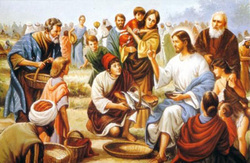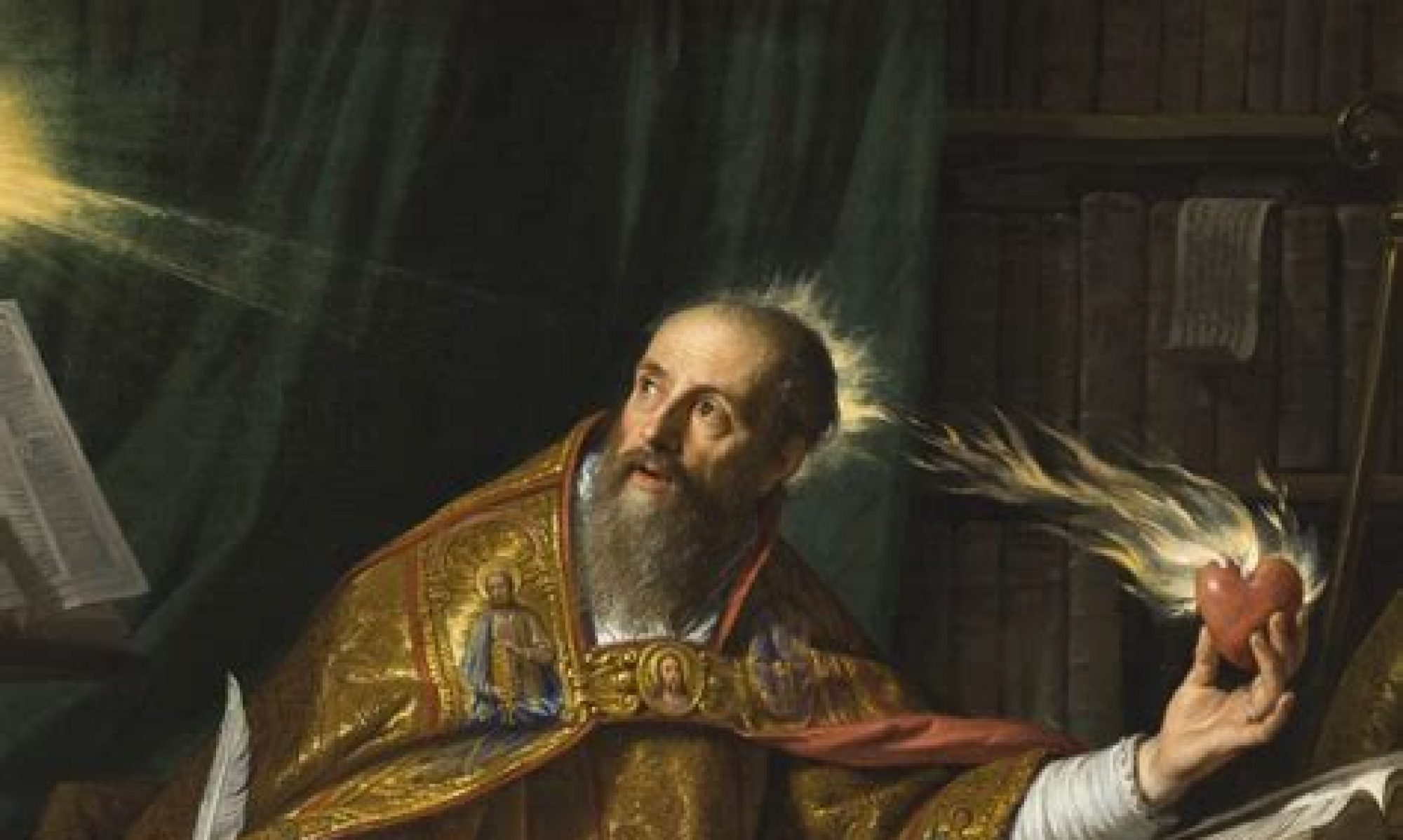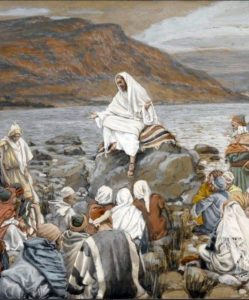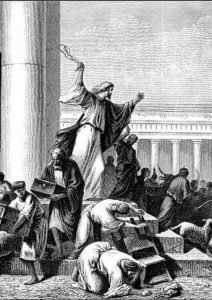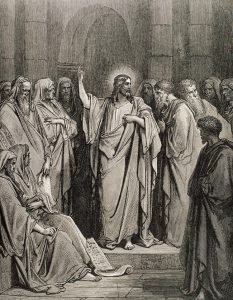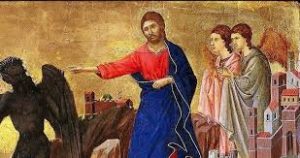At the recently concluded 10th National Eucharistic Congress, Catholic families gathered in Indianapolis, Indiana with a profound religious experience and personal renewal through the power of Christ’s loving presence in the Eucharist, the source and summit of our faith and Christian life. We appreciate the effort of the US Conference of Bishops to bring into our consciousness this Eucharistic revival, with the intention of facilitating this life-changing acceptance and belief in the real presence of Jesus after the consecration. If we don’t believe in Jesus being present in the Eucharist, His body, soul and divinity, we are weakened, and we become less responsive to service and love because we cannot offer something from what we truly believed and received. As our parish response, we are invited beginning on August 4, for a series of sessions from 2-3:30 PM. Please check the schedule in our bulletin.
We are in the 17th Sunday in Ordinary Time. Our readings today speak of God’s providence for us to be satisfied. The first reading from the 2nd book of Kings narrates to us about Elisha, a holy man who frequently visited a woman. He promised her that she would be blessed with a child because of her generosity when he comes to her house. Unfortunately, Elisha came back during the time of depression and famine. He gave the people food to eat, “when they had eaten there was some left over.” (v.43)
In today’s 2nd reading, St. Paul urges us “to live in a manner worthy of the call you have received.” This is the same calling we too received as we were baptized, which we hope that thru our renewal of mind and heart we shall live with humility, compassion, generosity, gentleness and love.
We will be hearing in the next three Sundays’ gospel about Jesus’ discourse on the Bread of Life, and today is Jesus’ miracle of the multiplication of the loaves. Jesus as Eucharist nourishes us, being familiar of the gift of God to the chosen people, the abiding gift of manna in the Old Testament.
The gospel today taken from St. John talks about the multiplication of the loaves. Jesus, seeing the large crowd following Him, was conscious of their hunger and intention to hear Him speak, and He was worried how He would feed them. Let us come to understand this gospel’s story.
First, Jesus asked Philip where they might buy enough food to feed everyone. With the help of Andrew, he found a boy with five barley loaves and two fish, and from that there was enough for everyone. It remained a mystery to His disciples. I believe that this teaching moment of Christ emphasizes compassion and generosity, and by putting a little of what we have could be translated into creating an endless abundance of what we truly need. But this concept of sharing would never decrease my belief that Jesus has performed a genuine miracle by multiplying the loaves and two fish. Jesus also teaches us to love and to have faith in each other and convinces us that even if we have shared what meager food we have, our own needs will always be satisfied.
Second, “Jesus took the loaves, gave thanks and distributed them to those who were reclining.” (v11) Five thousand people had their fill of bread and fish, and there were leftovers which filled 12 wicker baskets of fragments. This is a sign of abundance; thus people promoted Him as king because Jesus answered their bodily hunger, and they were very satisfied. With Jesus’ knowledge of the intent of the people, He slipped away in order to give them the opportunity to search in faith, not in accordance of their experience of being physically provided for with food, but leading them to accept and follow Jesus, the Messiah.
Third, our experience and encounter of Jesus in our daily Christian life significantly opens our hearts and minds to understand that signs and sacraments of His loving presence are essential to make a profound decision, not to look for a King, but a loving Savior.
It is revealed in the scriptures, both in the Old and New Testament, that the Eucharist is prefigured in the first reading, 2 Kings 4:42-44 and in John 6:1-15, that God provides nourishment for our journey to heaven. As a priest, chosen and allowing my two hands to consecrate the hosts and the wine, changing them into the real Body and Blood of Christ, is the greatest gift where God graciously empowers me to bring Jesus closer to you. I humbly feel the eucharistic presence of Jesus with such great blessings of faith and the faith of the whole community I am ministering. During the consecration, I am His servant, profoundly bowing my head, and my two arms closely attached to the altar as a gesture that I need to lean onto Christ, the altar, the center and the main actor of our celebration.
Apparently, for some it may be impossible to think of the reality of Jesus’ presence in the Eucharist; however, it is an act of faith to believe in Jesus. It may seem too little of a demand from us, and it requires humility to comprehend that Jesus opted to be present in the simple bread and wine, just as the Father, who created everything, opted to live with us in human flesh thru His Incarnate Son, Jesus Christ. Today, we need to realize that the all-powerful God has given an abundance of Himself to us.
May we continue to live as Eucharistic people. The more loving we are, the more we wish we could do to serve the marginalized people in our society by bringing hope, peace, love and justice as we all reclaim the reality of God’s presence and His Kingdom here on earth.
God bless you.
Fr. Arlon, osa
——————————
El Dictado del Corazón
Decimoséptimo Domingo del Tiempo Ordinario, Año B
- 2 Reyes 4:42-44
- Salmo 145:10-11, 15-16, 17-18
- Efesios 4:1-6
- Juan 6:1-15
Familias católicas se reunieron en Indiana, Indianápolis, para el recientemente concluido Décimo Congreso Eucarístico Nacional. Con una experiencia profunda y personal, de renovación a través del poder de la presencia amorosa de Cristo en la Santísima Eucaristía, que es la fuente y la cumbre de la fe católica. Apreciamos el esfuerzo de la Conferencia de Obispos de los Estados Unidos para traer a nuestra conciencia este renacimiento eucarístico. Para hacer conciencia y creencia que radique nuestra vida, en la presencia real de Jesús en la Eucaristía. Si no creemos en la presencia de Jesús en la Eucaristía, Su cuerpo, alma y divinidad, no estamos viviendo nuestra fe al máximo y nos volvemos menos receptivos al servicio y al amor. No podemos ofrecer lo que no tenemos. Los invitamos, a partir del 4 de Agosto, a una serie de sesiones de 2 a 3:30 p.m. Para ayudarlos y enseñarlos más sobre la Misa. Tomen un boletín para más detalles sobre horarios.
Estamos en el Decimoséptimo Domingo del Tiempo Ordinario. Nuestras lecturas de hoy hablan de la providencia de Dios. La primera lectura del segundo libro de los Reyes nos habla de Eliseo, un hombre santo que visitaba frecuentemente a una mujer, el le prometió que sería bendecida con un hijo, por su generosidad cuando él visitaba su casa. Desafortunadamente, Eliseo regresó en un tiempo de depresión y sequía. Dio de comer al pueblo, “cuando terminaron de comer, sobró un poco” (v. 43).
En la segunda lectura de hoy, San Pablo nos insta a “vivir de una manera digna del llamado que hemos recibido”. Este es el mismo llamado que recibimos en nuestro bautismo, y esperamos que a través de nuestra renovación de mente y corazón, vivamos con humildad, mansedumbre y amor.
En el evangelio de hoy, escuchamos el milagro de Jesús de la multiplicación de los panes. En los evangelios de los tres próximos domingos, escucharemos el discurso de Jesús sobre el Pan de Vida. Jesús en la Eucaristía, para alimentarnos, siendo familiar con el don de Dios al pueblo elegido, el don permanente del maná en el Antiguo Testamento.
El evangelio de hoy tomado de San Juan habla de la multiplicación de los panes. Jesús al ver la gran multitud que lo seguía, consciente del hambre que tenían y de la intención de escucharlo hablar, se preocupó de cómo los alimentaría. Entendamos mejor el relato de este evangelio.
Primero, Jesús le preguntó a Felipe dónde podrían comprar suficiente comida para alimentar a todos. Con la ayuda de Andrés, encontró a un niño con cinco panes de cebada y dos peces, pero no era suficiente para todos. Este momento de enseñanza de Cristo enfatiza la compasión y la generosidad, poner un poco de lo que tenemos, Jesús lo transforma en abundancia infinita para lo que realmente necesitamos. Jesús ha realizado un milagro genuino al multiplicar los panes y los dos peces. Jesús también nos enseña a amarnos y a tener fe en los demás. El compartir la escasa comida que tenemos, nuestras propias necesidades siempre estarán satisfechas.
En segundo lugar, “Jesús tomó los panes, dio gracias y los repartió a los que estaban recostados” (v. 11). Cinco mil personas se saciaron de pan y pescado y con los pedazos que sobraron de los cinco panes llenaron doce canastos. Esto es una señal de abundancia; por eso la gente lo quería como rey porque Jesús respondió a su hambre corporal, porque estaban satisfechos. Jesús conocía sus intenciones, así que se retiró para permitirles buscar con fe, no por su experiencia de ser satisfechos físicamente de alimento, sino guiándolos a aceptar y seguir a Jesús, el Mesías.
En tercer lugar, nuestra experiencia y encuentro con Jesús en nuestra vida diaria, abre significativamente nuestros corazones y mentes, para entender que los signos y sacramentos de Su presencia amorosa son esenciales para tomar una decisión profunda, no buscar un Rey sino un Salvador amoroso.
Se revela en las escrituras tanto del Antiguo como del Nuevo Testamento que la Eucaristía está prefigurada en la primera lectura de 2 Reyes 4:42-44 y Juan 6:1-15 que Dios provee alimento para nuestro viaje al cielo. Como sacerdote, elegido y permitiendo que mis manos consagren las hostias y el vino, en la transubstanciación, en el verdadero Cuerpo y Sangre de Cristo, es el regalo más grande que Dios gentilmente me capacita para acercar a Jesús a ustedes. Humildemente siento la presencia eucarística de Jesús con tan grandes bendiciones de fe y la fe de toda la comunidad a la que estoy ministrando. Durante la consagración, soy su siervo, inclinando profundamente mi cabeza y mis dos brazos pegados al altar es un gesto que necesito para apoyarme en Cristo, el altar, el centro y el actor principal de nuestra celebración.
Aparentemente, para algunos puede ser imposible pensar en la realidad de la presencia de Jesús en la Eucaristía, sin embargo, es un acto de fe creer en Jesús. Puede parecer muy poco para exigirnos, pero requiere humildad para comprender a Jesús que optó por estar presente en el simple pan y vino, así como el Padre, que creó todo, optó por vivir con nosotros en carne humana a través de su Hijo encarnado, Jesucristo. Hoy, necesitamos darnos cuenta de que el Dios todopoderoso nos ha dado una abundancia de Sí mismo.
Que sigamos viviendo como personas eucarísticas. Cuanto más amorosos seamos, más desearemos poder servir a las personas marginadas de nuestra sociedad, llevando esperanza, paz, amor y justicia mientras todos reclamamos la realidad de la presencia de Dios y su Reino aquí en la tierra.
Dios los bendiga.
Padre Arlon, osa
